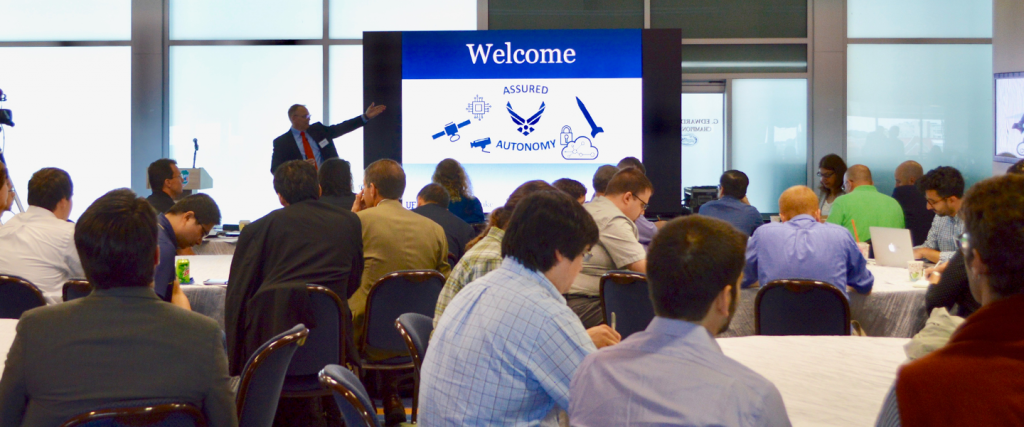
The University of Florida (UF), Duke University (Duke), the University of Texas at Austin (UTA) and the University of California Santa Cruz (UCSC) were recently awarded an “Air Force Office of Scientific Research (AFOSR) Center of Excellence (CoE) for Assured Autonomy in Contested Environments.” The consortium will collaborate with the Munitions (RW), Sensors (RY), and Space Vehicles (RV) Directorates within the Air Force Research Laboratory (AFRL).
AFOSR selected the UF-led team as the single winner of this prestigious Center of Excellence from among several elite groups competing across the nation. The sponsorship will cover an initial two-year period of $2 million, with optional extensions up to a total of six years and $6 million dollars. Frederick A. Leve, Ph.D., program officer for the Dynamics and Controls Program at the Air Force Office of Scientific Research, said, “This Center of Excellence is the scientific embodiment of basic research for assured and trustworthy autonomy of the U.S. Air Force’s future cyber physical systems operating in contested environments.”

Dr. Warren Dixon
Dr. Warren Dixon, Newton C. Ebaugh Professor in the Department of Mechanical & Aerospace Engineering at the UF Herbert Wertheim College of Engineering, will lead the Center’s efforts. Dr. Dixon and his colleagues from UF, Duke, UTA, and UCSC will focus on fundamental research to enable cyber secure robotic systems with new capabilities.
To enable these capabilities, research breakthroughs are required in the mathematics of learning, game theory, optimization, automatic control, sensing, communications, networking, and resilience to cyber effects. The team is composed of researchers in aerospace, computer, electrical, and mechanical engineering to tackle the diverse areas of expertise required.
Looking to the results of the center’s research, Dixon said, “Key innovations will include analysis, design and synthesis of tools that enable autonomous mission execution despite uncertainty within complex dynamics while still accounting for the integrity and privacy of information on computationally constrained resources.”
Assured autonomy exists when automated, machine-intelligent technology is ensured to complete missions despite the complex adversarial environment within which it would work.
“Autonomous systems must execute high-level mission plans with verifiable assurances despite uncertain adversarial environments where the integrity and availability of sensor information and communications are challenged,” Dixon explained.
Assured Autonomy tips the scales toward deterrence
The military views assured autonomy as an element of the Department of Defense’s “Third Offset Strategy.” Autonomy offsets an adversary’s advantages by allowing scaled force projection while keeping people out of harm’s way. This offset strategy should motivate contestants to opt for negotiation strategies rather than engagement.
The AFOSR Center of Excellence will be the first to look at assured autonomy in an adversarial environment. The Center will function as a hub where ideas and people are freely engaged, and exchanges flow between military laboratories and universities. Participating universities and military laboratories will jointly publish the research results. Further, a strong workforce development component may see university graduates becoming future military researchers and technologists. “As we think about next-generation conflicts, we need next-generation engineers who know how to think about responding to them, engineering original designs for new autonomous agents that make them more resilient,” Dixon said.
The Center of Excellence will focus on the development of robotic systems that make the best possible decisions despite uncertainties that may occur as a result of denied or corrupted information caused by an adversarial environment. Research topics that members of the Center will study include:
- New mathematical theories and strategies that enable the integration of logic-based decisions with dynamic robotic vehicles
- New machine adaptation and learning development to enable real-time agility in the presence of complex adversarial environments
- New network (Cyber Physical Systems/Internet of Things (IoT)) methods that enable teams of robotic agents to collaborate over resilient networks and cloud computing while also compromising adversaries’ capabilities
- New methods that enable resiliency to cyber effects, including designed resiliency, monitoring techniques, and flexible computation in the presence of an attack
- New methods to protect safety and mission-critical information through privacy in computation, communication, and task execution
The Center of Excellence will also be tasked to develop next-generation autonomous technologies with cyber resiliency and privacy engineered into the design, outcomes that will have widespread impact on commercial and industrial robotic systems, including automated systems in our homes and transportation systems. Additionally, with the rapid advancement of the Internet of Things as well as the ever-growing autonomous vehicle industry, privacy, security, guaranteed performance and safety have become major concerns in our everyday lives. As such, any advances for assured autonomy in contested environments will have a significant impact in non-contested environments, particularly in the areas of privacy and independence.
